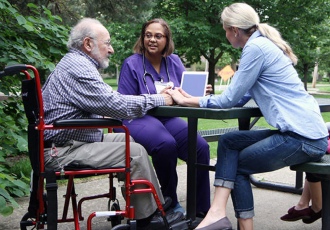By Henri Nammour, MD, Regional Medical Director, VITAS Healthcare
Two findings caught my eye in the Lee, et al., study of POLST documents and ICU admissions:
- The first involves data: 38% of patients received unwanted, goal-discordant intensive/interventional care near the end of life.
- The second is the researchers’ quoted observation: “The experiences of ICU patients and survivors suggest that patients receiving aggressive, life-sustaining treatment experience a high burden of unrelieved physical symptoms and emotional distress.”
For patients who do not want aggressive treatments as they’re dying, unwanted intensive care also incurs “physical, emotional, and financial costs while providing little value,” the researchers point out. Clinicians understand that care provided near the end of life represents a disproportionate amount of health care expenditures.
In essence, nearly 40% of patients—even if they have clearly documented their wishes for end-of-life care with limited intervention or comfort measures only— are still not able to die the way they prefer to die: without pain or intrusive care, in the place they call home, surrounded by loved ones and family.
Quick Facts: 7 Things to Know About Advance Directives for Your Patients >
With an eye on comfort and compassion, physicians and clinicians must be more aggressive in their discussions with patients about their goals, preferences, and values as they approach the end of life.
It is critically important to talk honestly and openly with patients about the care they want as they are dying. And, among patients who receive care not consistent with POLST, we must continue to engage in goals-of-care conversations to ensure wishes and values are met.
Dr. Illeana Leyva and Dr. Eric Shaban, VITAS regional medical directors, give a step-by-step demonstration of how to approach a goals-of-care conversation.


